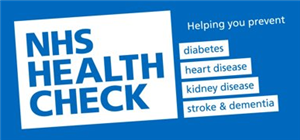NHS Health Check - a prevention programme for cardiovascular disease

What is an NHS Health Check?
For adults in England aged 40-74 without a pre-existing cardiovascular (CVD) condition, it checks your circulatory and vascular health and what your risk of getting a disabling vascular disease is. You will be invited once every five years under this programme, unless you are identified as high risk or have one of the conditions, you will then be reviewed annually by your GP. Cardiovascular disease covers many diseases.
How do I get an NHS Health Check?
Aged 40-74 without a pre-existing cardiovascular (CVD) condition like diabetes, high blood pressure, kidney disease or other CVD condition, you can expect to receive an invitation from your GP inviting you for a free NHS Health Check once every five years. If you think you are eligible why wait, contact your GP
Why should I have one?
As we get older, we have a higher risk of developing something dangerous like high blood pressure, heart disease or type 2 diabetes. For example being overweight or obese increases your risk of developing high blood pressure, heart disease, stroke, diabetes and some cancers.
Your NHS Health Check can spot early signs and help prevent these happening to you, which means you'll be more likely to enjoy life for longer. Those aged 65 plus are also given information regarding dementia.
How much do they cost?
Nothing, they are free to patients.
What can I do to improve my health?
Small changes to your habits can have a surprising effect on your health. For example, giving up smoking dramatically reduces your risk of heart attack, stroke and cancer, and so does regular physical activity, eating healthily and drinking sensibly. Making these changes could add many years to your life.
Here are some of the diseases that we are trying to prevent?
- Heart disease
- Chronic kidney disease (CKD)
- Diabetes
- Hypertension (BP-Blood Pressure)
- Atrial fibrillation (AF)
- Transient ischemic attack (TIA)
- Hypercholesterolemia
- Heart failure
- Peripheral arterial disease
- Stroke
Further information
NHS Website: What happens at an NHS Health Check? - NHS (www.nhs.uk)
Know your heart age
What this self-assessment does:
- Tells you your heart age compared to your real age
- Explains why it's important to know your blood pressure and cholesterol numbers
- Gives advice on how to reduce your heart age
Heart age tool: What's your heart age? - NHS (www.nhs.uk)
Want to know more about blood pressure
High blood pressure can raise your risk of developing serious conditions like heart disease and dementia. Known as the ‘silent killer’, high blood pressure rarely has obvious symptoms but, left untreated, it increases your risk of heart attack or stroke.
Whilst you may need medication, the good news is that you may well be able to lower your blood pressure through lifestyle changes such as:
- Losing weight (if overweight)
- Reducing the amount of salt in your diet
- Exercising regularly
- Cutting back on alcohol and caffeine
